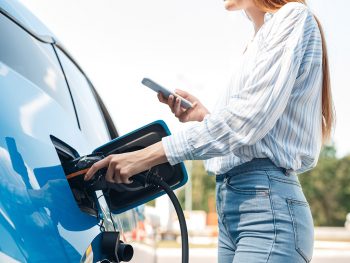Slow charging could be costliest option for EV drivers
Electric vehicle drivers could actually be paying more for slow charging than when using ultra-rapids, new research has revealed.

The AA says drivers should check charging rates before they plug in
While the overall cost of flat-rate slow charging rates dropped by 17p/kWh from November to December, the arrival of peak and off-peak rates is skewing things for drivers, according to analysis by the AA.
Its EV Recharge Report for December shows the impact of the arrival of peak and off-peak rates among some charging providers. While this manages demand, ensuring power can be provided throughout the day, and stops drivers from overstaying their welcome, it could bring a nasty shock when it comes to charging bills.
The report – the second in a new series to help show how the cost of charging moves over time – reveals that both flat-rate and off-peak slow charging averaged 37p per kWh in December but peak costs hit 72p. That’s higher than the average unit charge for fast (55p/kWh), rapid (62p/kWh) and even ultra-rapid (70p/kWh).
The AA is now warning drivers to check charging rates before they plug in but also says the Government must keep an eye on prices.
AA EV Recharge Report – December 2022 (All PAYG prices not including connection fees where applicable)
| Charger type | Speed (kW) | December Average price (p/kWh)2 | November Average price (p/kWh)2 | Price change (p/kWh) | Cost to charge 80% at Ave p/kWh3 | Pence per mile (p/mile) |
| Domestic | 3-7 kW | 34 p/kWh | 34 p/kWh | 0 p/kWh | £13.60 | 7.64 p/mile |
| Slow (Flat rate) | Up to 7kW | 37 p/kWh | 54 p/kWh | -17 p/kWh | £14.80 | 8.31 p/mile |
| Slow (Off-Peak) | Up to 7kW | 37 p/kWh | N/A | N/A | £14.80 | 8.31 p/mile |
| Slow (Peak) | Up to 7kW | 72 p/kWh | N/A | N/A | £28.80 | 16.18 p/mile |
| Fast | 8-22 kW | 55 p/kWh | 49 p/kWh | +6 p/kWh | £22.00 | 12.36 p/mile |
| Rapid | 23-100 kW | 68 p/kWh | 60 p/kWh | +8 p/kWh | £27.20 | 15.28 p/mile |
| Ultra-rapid | +101 kW | 70 p/kWh | 69 p/kWh | +1 p/kWh | £28.00 | 15.73 p/mile |
The data also shows that ongoing drops in the pump price of petrol mean that a petrol combustion engine vehicle is cheaper to run per mile (14.45p/mile) than an EV exclusively using the fastest types of chargers. But electric vehicle drivers solely using rapid and ultra-rapid chargers on longer journeys or as a quick top-up – which accounts for the majority of EV motorists – will still save money when comparing overall running costs with a petrol car.
Jack Cousens, head of roads policy and recharging, said: “The introduction of peak and off-peak charging mirrors many domestic energy providers’ offering to EV owners. We completely understand why this has been introduced as it allows the supply of electricity to remain constant throughout the day while ensuring drivers don’t overstay their welcome. However, the price gap between the two is staggering, so much like refilling a petrol or diesel car, drivers should check the rates they could be paying before plugging in.
“While pump prices are falling, electricity prices are going in the other direction, but we are hopeful prices could tail off later this year. The Government must keep an eye on prices and act if necessary. Unlike fuel, EV charging already has a regulator in place to monitor public charging rates and they shouldn’t be afraid to step in if prices escalate.”

